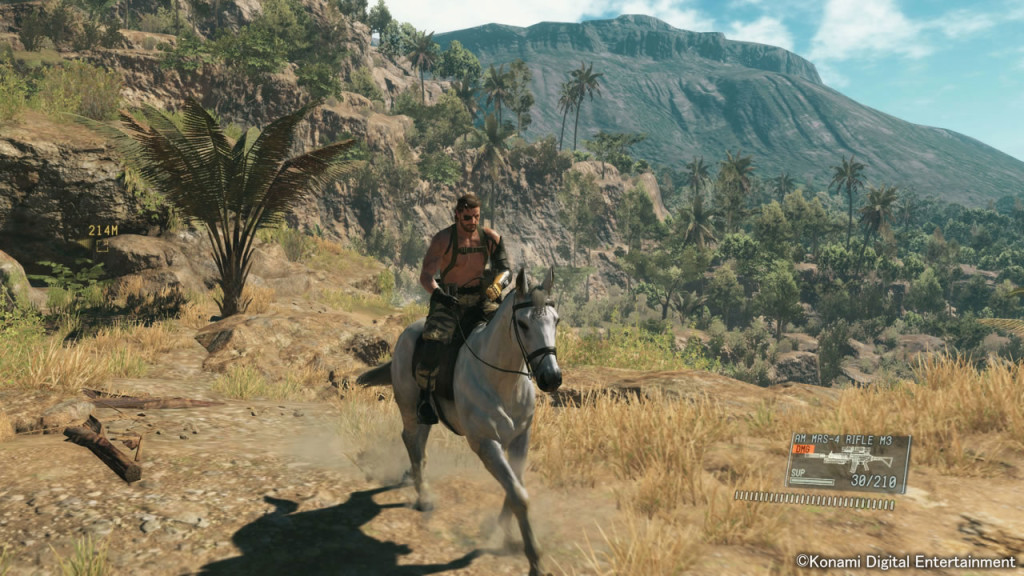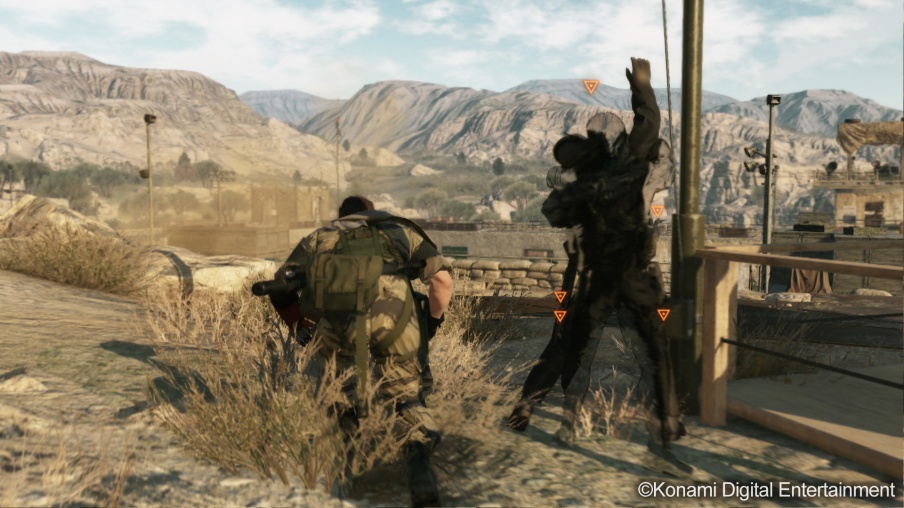34 hours in, and I’m still not bored of The Phantom Pain. This scares me, a little bit. Every single design decision in this game feels tailored for me, and considering my open disdain for modern open world game design, that’s an accomplishment and a half. I usually hate these games for a number of reasons, mostly due to a lack of focus, a lack of challenge, and an ever-increasing kleptomania towards useless objects, but clearly Kojima analyzed them all in the process of development. At base, it’s an open world game that lacks the bloat.
I think the best design, however, lies in the story. Or rather, the way by which Metal Gear Solid V conveys the story to the player. In one sense, and that would be the “Metal Gear Solid fan” sense, MGSV’s story seems…well, terrible. Long gone are the endless cutscenes of Metal Gear Solid 4; in their place comes the occasional well-scripted, well-acted digital cutscene interspersed through several hours of game. At times, I found myself without a new plot-relevant (assuming the plot IS important at all – we’ll get to that) piece of information for hours on end. Yes, people continue to ramble on about military geek-out terminology and whatever 1980s B-movie science-fiction plot twist Kojima happens to love at the moment (the man sure loves his scientific magic explanations with no real world grounding), but it’s remarkably straightforward so far. There is a bad guy, he has a convoluted plan of some sort, go get him. There’s intimations of MGS lore, but nothing that would turn off a new player.

In fact, I’d say Metal Gear Solid V cares the least about “story” in the traditional, linear sense that we assume Kojima uses. Instead, in the “last” game in the series, Metal Gear Solid turns into a very good piece of interactive fiction. People tell you what to do; you figure out how to do it. The game contains myriad hidden, convoluted mechanics that can help and hinder you; only experimentation will lead to discovery. Technically, there’s “linearity”, but only in select spots; you can simply decide to wander around the open world and finish Side Ops if you so choose, or look for some vintage 1980s cassette tapes to place in your Walkman. All of them involve the best stealth-action mechanics ever designed by a wide margin, and that set of tools seems nigh-endless at times. Kojima wants players to, in some way, make their mark on the world by whatever means, and the constant back-and-forth between missions and building up Mother Base creates an incredibly addicting flow.
That said, the best part of that “interactive fiction” comes from the cassette tapes. They divulge the majority of the backstory, while allowing the player to continue his silly, violent, and sometimes hilarious jaunts through enemy territory. Want to know about Afghanistan during 1984, especially the attempted Soviet occupation? Here you go, says Kojima! Surprisingly, Kojima dialogue works wonderfully as radio drama, and apparently he picked Kiefer Sutherland to lend appropriate gravitas to it. As you play, the tapes begin to give you context for the state of the open world you inhabit; it’s almost story-by-osmosis. You aren’t paying attention sometimes, and yet you start understanding why the Angola-Zaire border looks so wartorn, or the reality of child soldiers, or any number of other geopolitical issues. They enhance your portrait of the game world while you play it, and almost never wrest control from the player. Occasionally, the game does interrupt the tapes to tell you IMPORTANT THINGS about THIS MEDICINAL PLANT DOES SOMETHING, but for the most part the tapes play uninterrupted.
And, if you so choose, you can completely ignore them! If you just like wearing funny hats and sicking your dog on people, or making your horse poop, or sending your supernatural sniper buddy to put a whole guard post to sleep, you can do that too! Regardless of how you choose to interact with it, the “sense” of a story comes through, no matter whether player-driven or from the mind of that weird “auteur” guy with the glasses who worked on a series for far too long. Every element of the game gives you an incredible sense of “story” without letting that story get in the way of the player’s interactions with the world. I would call it completely unobtrusive; yes, this from the man who literally created the modern cutscene-heavy AAA video game market singlehandedly. Metal Gear Solid V is far less action film and more action video game, and somehow becomes all the better for it.
I like to think of the Bible in this sense, as well. Technically, the Bible is 66 different books; some of them repeat, telling the same story, but they build upon each other. Each gives you a sense of the author’s priorities, what exactly they were trying to convey, and what they thought felt important. Does the Bible actually have a “scarlet thread”, as they say? Surely it does, but definitely NOT in the modern literary sense of a linear narrative. Rather, over time and study, it reveals the world as it stood to God’s chosen people, in the past, present, and future – it is a library of diverse origins centered on a central point. None of that diminishes the Christian message at all; rather, it gives it life.
Eventually, at least that I’ve found, the little detail strike you, regardless of whether you can discern their meaning. Why does the rooster crow twice when Peter denies Jesus three times in Mark? Go look it up, and you’ll find that this does not appear in any of the other three Gospels. Mark, however, found this an important enough detail to include.
30 And Jesus *said to him, “Truly I say to you, that [a]this very night, before a rooster crows twice, you yourself will deny Me three times.”
Remember that Matthew and Luke crib a whole lot of stories from Mark (the Synoptic Gospels, as they call them); why don’t the other two bother to remember this extraneous detail? In Mark, the rooster crows after Denial 1 and 3, for reasons that aren’t even clear! They are bizarre details, to say the least. I honestly don’t know, and probably will never know, why it’s in there, but how fascinating! I guess the academic in me likes that sort of thing. Is it important? Beats me! But man, is it ever fascinating, and do I ever want to know more!
The best games have that sense of an interesting world, and Metal Gear Solid V, in contrast to its predecessors, is one of them.

